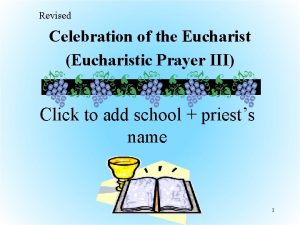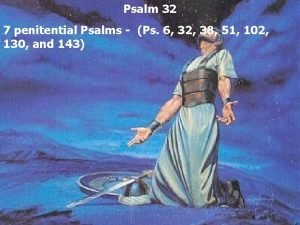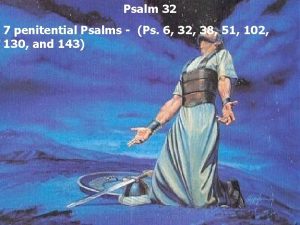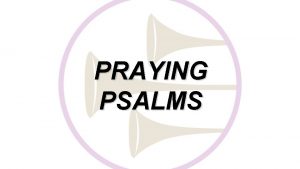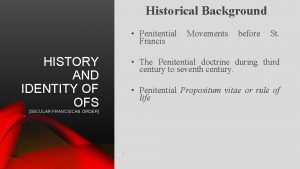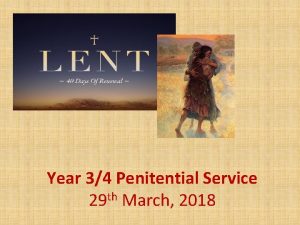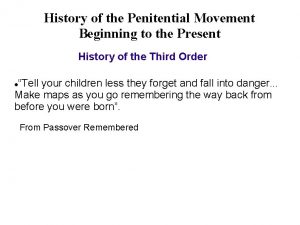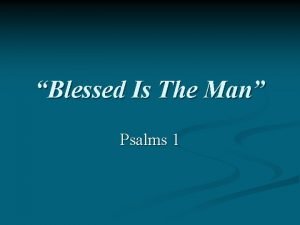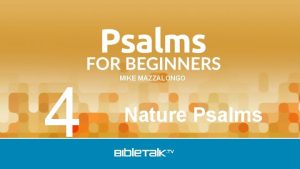Penitential Psalms Penitential Psalms The Penitential Psalms or













- Slides: 13

Penitential Psalms

Penitential Psalms • The Penitential Psalms or Psalms of Confession, so named in Cassiodorus's commentary of the 6 th century AD, are the Psalms 6, 32, 38, 51, 102, 130, and 143. • We plan to study Psalm 6, 32, 38, 51, and 102

Penitential Psalms • These psalms are expressive of sorrow for sin. Four were known as 'penitential psalms' by St. Augustine of Hippo in the early 5 th century. The fifty-first Psalm (Miserere) was recited at the close of daily morning service in the primitive Church. Translations of the penitential psalms were undertaken by some of the greatest poets in Renaissance England, including Sir Thomas Wyatt, Henry Howard, Earl of Surrey, and Sir Philip Sidney

PSALM 6 • God’s displeasure with sin (v. 1) • Man’s need for mercy and healing (v. 2) • The effects of sin include trouble both mental and physical (v. 3) • Hope while alive (vv. 4 -5). • Weariness, groaning, sleeplessness, and many tears (vv. 6 -7) • God answers with mercy (vv. 8 -10)

Penitential Psalms • Psalm 32 • Blessings, happiness, joy is for those whose transgression (violation of law), is covered not imputed (counted against). • It is for those who are honest before God (no deceit). • This requires confession and prayer to God! (verses 3 -6)

Psalm 32 • This also requires sincerity (flood of great waters). (v. 6). • The psalmist looked to God for refuge, deliverance, and instruction (vv. 7 -9) • His observations are “sorrow to the wicked, but he who trusts in the Lord, mercy shall surround him” (v. 10). • Forgiveness should lead to joy!

PSALM 38 • This psalm is a plea from David expressing his sorrow for his sins. • He knows of God’s displeasure (vv. 1 -2) • David has no soundness nor health due to his sin (vv. 3 -8). Sin brings wounds, burdens, groaning, trouble, & mourning. • Sin is personal (vv. 9 -11)

PSALM 38 • Sin opens the doors for our enemies and the enemies of God (vv. 15 -19) • Sin leads to destruction (fall) unless repentance is forthcoming (v. 20) • David’s need for God due to sin is the same need we have for Christ. (Eph. 1: 7).

PSALM 51 • This psalm is written by David. It is thought to be after his sin in going in to Bathsheba. • He seeks God’s mercy and lovingkindness • He acknowledges his sins, iniquity, transgressions, and evil (vv. 2 -4). • He needs cleansing or washing (vv. 7 -10). This is inner cleansing (a clean heart).

PSALM 51 • He seeks God’s favor again • He asks for “deliverance from the guilt of bloodshed” (v. 14) • He praises God • He has “a broken and contrite heart” (v. 17) • He prays for others (v. 18) • Sacrifices are only for those with a right heart toward God (v. 19)

PSALM 102 • • • This is called “A Prayer of the Afflicted. ” He asks God to “Hear his prayer” (vv. 1 -2) He wants God’s face to see him He wants God to “answer me speedily. ” His condition is spiritual and physical and his descriptions clear show his pain. “My heart is stricken, ” “My bones cling to my skin…”(vv. 47)

PSALM 102 • He has major problems with his enemies (v. 8) • But, most of all God has been displeased with him (v. 9 -11). He apparently is representing the nation and its sins. • Praise to God for His greatness and His deliverance (vv. 12 -22) • He breaks out in praise to God (vv. 23 -28)

MESSAGES RECEIVED? • What do these psalms teach us about sin? • What do they teach us about the damage done by sin? • What do we learn about repentance, forgiveness, and renewed hope?
 Penitential act
Penitential act Nicene vs apostles creed
Nicene vs apostles creed Penitential rite prayer
Penitential rite prayer Thể thơ truyền thống
Thể thơ truyền thống Các châu lục và đại dương trên thế giới
Các châu lục và đại dương trên thế giới Sự nuôi và dạy con của hổ
Sự nuôi và dạy con của hổ Bổ thể
Bổ thể Diễn thế sinh thái là
Diễn thế sinh thái là Vẽ hình chiếu vuông góc của vật thể sau
Vẽ hình chiếu vuông góc của vật thể sau Phép trừ bù
Phép trừ bù Thế nào là mạng điện lắp đặt kiểu nổi
Thế nào là mạng điện lắp đặt kiểu nổi Lời thề hippocrates
Lời thề hippocrates Alleluia hat len nguoi oi
Alleluia hat len nguoi oi đại từ thay thế
đại từ thay thế


